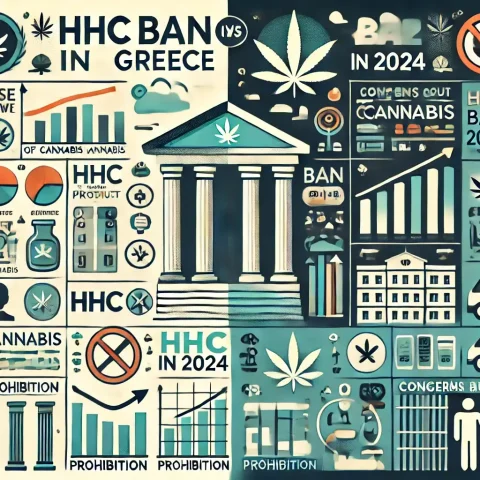- From legal loophole to prohibition: Greek hemp market's transformative year
The HHC Craze in Greece: 5 Key Lessons from Its Rise and Ban

Contents
Contents
Introduction: What is HHC and Why Did Greece Ban It?
In January 2024, Greece implemented a nationwide ban on HHC (Hexahydrocannabinol), a semi-synthetic cannabinoid that had recently gained popularity. HHC, known for being hydrogenated from THC, provides a similar psychoactive effect, albeit reportedly milder. Its rise in Greece reflected a growing trend of consumers seeking legal alternatives to THC, especially as HHC products became readily available in the market.
Before the ban, an estimated half of Greek cannabis users had experimented with HHC, drawn by its legal status and softer effects compared to traditional THC. However, the Hellenic Ministry of Health stepped in, citing public health concerns due to the unregulated nature of HHC products, which could pose risks due to the lack of comprehensive safety studies.
For Greek consumers and businesses, the ban represents a shift in the legal landscape, affecting a booming sector. The decision also aligns with a broader European approach, where countries are increasingly reevaluating synthetic cannabinoids like HHC.
HHC in Greece: From Popularity to Prohibition
Before its ban in January 2024, HHC (Hexahydrocannabinol) saw a rapid rise in popularity across Greece. Marketed as a legal alternative to THC, it attracted a growing number of users looking for psychoactive effects without legal consequences. During its peak in 2023, some retailers in Greece reported up to a 300% increase in HHC product sales, driven by demand for a THC substitute that remained within a legal grey area.
HHC’s rapid rise mirrored trends across Europe, with Greece becoming one of the many countries grappling with the regulation of synthetic cannabinoids. However, concerns began to mount. The Hellenic Ministry of Health pointed to a lack of research on HHC’s long-term effects and the risks posed by unregulated products. This culminated in the January 2024 ban, which was enacted to protect public health from potential unknown dangers.
The ban had immediate effects. Retailers were forced to remove HHC products from their shelves, while consumers sought alternatives, either reverting to legal CBD products or exploring other grey-market cannabinoids. The prohibition highlights Greece’s cautious approach to synthetic cannabinoids, reflecting broader regulatory movements across Europe.
The Market Impact of Greece’s HHC Ban
The January 2024 HHC (Hexahydrocannabinol) ban in Greece sent ripples through the cannabis industry, creating notable disruptions for retailers and consumers alike. HHC, a semi-synthetic cannabinoid, had gained popularity for its legal status and psychoactive effects, but the prohibition caused immediate repercussions.
Retailers, who had capitalized on HHC’s market surge, faced substantial losses. “We had to remove over €10,000 worth of stock overnight,” noted Dimitris, owner of a popular Athens vape shop. Many stores had invested heavily in HHC, and the sudden ban left them scrambling to adapt. According to industry reports, revenues for some businesses dropped by as much as 50% within the first month following the ban.
For consumers, the ban left a gap in the market. Many had turned to HHC as a legal alternative to THC, and now had to shift back to products like CBD or explore the grey market for alternatives. The increased demand for CBD was noticeable—retailers reported a surge in CBD sales following the HHC prohibition, though these products do not offer the same psychoactive effects.
The ban also raised concerns about unregulated products. Some consumers have turned to unregulated online markets to access HHC, posing risks related to product safety and quality. “We’re seeing an uptick in unsafe, unregulated products circulating online,” Dimitris shared, reflecting the feedback he’s received from his clients.
The ban has triggered ongoing discussions in Greece about the regulation of synthetic cannabinoids and the future of the country’s cannabis market. Greek authorities have indicated that the move is part of a broader effort to ensure public safety amid the proliferation of unregulated synthetic substances.
In the months following the ban, the Greek Parliament has expressed interest in reviewing cannabis legislation, signaling that Greece’s cannabis market may continue to evolve in the coming years.
Legal Alternatives to HHC in Greece
Following the 2024 ban on HHC in Greece, consumers are turning to other legal or semi-legal cannabinoids that offer similar or complementary effects. Below is a comparison of several alternative cannabinoids, each with different levels of potency, effects, and potential medical applications.
| Cannabinoid | Potency | Effects | Legal Status | Potential Applications |
|---|---|---|---|---|
| CBG | Mild | Non-psychoactive, calming | Legal in most places | Anti-inflammatory, pain relief, neuroprotection |
| THCP | Very High | Strong euphoria, deep relaxation, sedation | Largely unregulated or restricted | Pain relief, sleep aid, inflammation management |
| THCO | High | Intense psychoactive effects, slower onset | Legal grey area | Potent effects for pain, potential anti-inflammatory |
| THC-JD | Very High | Strong euphoria, sedation | Largely unregulated or restricted | Strong analgesic, anti-inflammatory effects |
| H4CBD | Mild (more potent than CBD) | Non-psychoactive, minimal effects | Legal in most places (CBD derivative) | Anti-inflammatory, pain relief, neuroprotection |
| CB9 | Unknown, potential mild effects | Mild euphoria, possibly therapeutic | Mostly unregulated, early-stage research | Potential anti-inflammatory, pain relief |
| CBD | Low (non-psychoactive) | Non-psychoactive, calming | Legal in many regions | Anxiety, pain relief, inflammation, epilepsy, neuroprotection |
With HHC no longer an option, consumers in Greece may explore these legal or semi-legal cannabinoids. The market is adapting by promoting non-psychoactive options like CBD and CBG, as well as more potent synthetic cannabinoids like THCP and THCO, all of which offer unique benefits depending on the user’s needs. The rise of these alternatives could shape the future of cannabis use in the country.
This overview provides a comprehensive perspective on what’s available in the Greek market post-HHC ban. Always consult with healthcare professionals and research local laws before exploring any of these cannabinoids.
International Implications: Could Greece’s Ban Influence Other European Countries?
The ripple effects of Greece’s ban on HHC (Hexahydrocannabinol) in January 2024 are being felt across Europe. Malta followed suit shortly after, implementing a similar ban in February 2024 to protect children and public health. This reflects a growing European concern regarding the unregulated nature of synthetic cannabinoids like HHC and their potential risks to public safety.
However, not all European countries are opting for prohibition. In the Czech Republic, a recent study has backed full cannabis legalization, projecting CZK 5.5 billion (approximately EUR 230 million) in annual social benefits. This showcases a different approach in the region, as some countries seek to capitalize on the benefits of a regulated cannabis market rather than impose outright bans.
In 2023, the Czech Republic also banned HHC, aligning with Greece’s concerns over public health and lack of research on long-term effects. Such actions demonstrate a strong stance against unregulated products, which could potentially influence other neighboring countries.
Meanwhile, Germany has taken a contrasting approach by legalizing THC for recreational use in 2023. Although synthetic cannabinoids, including HHC, remain unregulated and under scrutiny, Germany’s framework may pave the way for clearer guidelines regarding synthetic substances while embracing natural cannabinoids.
In Italy, the cannabis landscape remains strict, with regulations on synthetic cannabinoids frequently changing. The bans in Greece and the Czech Republic may influence Italy’s regulatory stance, potentially pushing toward further restrictions.
As more countries like Greece and Malta take action, Europe could see a broader trend towards stricter regulation or outright bans on synthetic cannabinoids. The European Monitoring Centre for Drugs and Drug Addiction (EMCDDA) may eventually advocate for unified EU-wide policies to address these substances.

Prevalence of cannabis use in Europe
Safety Concerns and Regulatory Challenges of Synthetic Cannabinoids
Synthetic cannabinoids like HHC pose significant safety risks due to their unpredictable effects and potency. Unlike natural cannabinoids, they often bind more strongly to cannabinoid receptors, leading to severe side effects such as anxiety, hallucinations, seizures, and heart issues. Contamination and unregulated production further increase health risks.
From a regulatory perspective, synthetic cannabinoids are challenging to control because minor chemical changes can evade existing laws. While Greece and Czech Republic have banned HHC, laws vary across Europe, creating a fragmented regulatory landscape. This inconsistency allows synthetic cannabinoids to thrive in grey markets, posing ongoing public health risks.
To address these issues, stronger regulations, international cooperation, and more public awareness campaigns are needed to protect consumers from the dangers of unregulated synthetic cannabinoids.
The Future of HHC in Greece: What’s Next?
Following Greece’s ban on HHC (Hexahydrocannabinol) in January 2024, the future of this synthetic cannabinoid remains uncertain. As regulators assess the risks of unregulated production and potential health concerns, any reconsideration of its status will likely hinge on ongoing EU-wide research into synthetic cannabinoids. Greece, along with countries like the Czech Republic, has been proactive in restricting HHC, aligning with growing European concerns about these compounds.
For the Greek cannabis market, businesses have shifted focus to legal alternatives like CBD and CBG, while consumers are left with fewer psychoactive options. Meanwhile, the possibility of a unified European regulatory approach remains on the horizon, especially as countries like Germany push forward with broader cannabis reforms.
As research evolves, the future of HHC in Greece may depend on international trends and the development of safer, regulated alternatives.
FAQs on HHC in Greece
The recent ban on HHC (Hexahydrocannabinol) in Greece has left consumers and businesses with many questions regarding the implications of the prohibition. This FAQ aims to clarify the key aspects of the ban, provide insights into alternative cannabinoids, and discuss its potential impact on the future of cannabinoid regulation in Greece.
1. What is HHC, and why was it banned in Greece?
HHC is a semi-synthetic cannabinoid that was once marketed as a legal alternative to THC due to its psychoactive effects. Greece banned HHC in January 2024 following concerns over public health, unpredictable side effects, and lack of sufficient research. The ban was part of the country’s broader efforts to regulate synthetic cannabinoids.
2. Is HHC now completely illegal in Greece?
Yes, after January 2024, HHC became illegal to manufacture, distribute, or sell in Greece. Authorities also took measures to remove products containing HHC from the market.
3. How does HHC compare to THC?
HHC is chemically similar to THC but tends to be less potent. However, because HHC is synthetic, its effects can be unpredictable and sometimes stronger than natural cannabinoids. This unpredictability contributed to its ban.
4. Are there legal alternatives to HHC in Greece?
Yes, cannabinoids like CBD, CBG, and H4CBD remain legal in Greece. These compounds are either non-psychoactive or have milder psychoactive effects and are still available through legal channels.
5. How has the HHC ban impacted Greek businesses?
Greek retailers faced significant financial losses due to the ban. Many had to remove HHC products from their shelves, leading to a sudden drop in revenue. Retailers have since shifted their focus to legal alternatives like CBD.
6. Is HHC banned in other European countries?
Yes, other countries like the Czech Republic and Malta have also banned HHC. Although the legal status of HHC varies across Europe, there is an increasing trend of stricter regulation of synthetic cannabinoids in the region.
7. What are the main health risks of HHC?
The health risks of HHC include heightened anxiety, hallucinations, cardiovascular issues, and unpredictable psychoactive effects. The lack of research on HHC and its synthetic nature adds to these concerns, making it riskier than well-studied natural cannabinoids.
8. Could Greece reverse the ban on HHC?
While a reversal seems unlikely in the near term, Greece’s stance on cannabinoids may evolve as more research emerges. Any policy change would likely be influenced by broader EU trends and further research into synthetic cannabinoids.
9. How does the HHC ban fit into Greece’s broader drug policy?
The ban aligns with Greece’s focus on public health and safety. While Greece remains strict on synthetic cannabinoids, the country has a more lenient approach toward medical cannabis, which was legalized in 2017. The future of cannabinoid regulation in Greece will likely depend on the European Union’s stance on such substances.
Conclusion: The Evolution of HHC in Greece
HHC’s rise and subsequent ban in Greece highlight the complexities of regulating new cannabinoids. While Greece opted for prohibition in January 2024 due to health concerns, countries like Germany have taken a different path, legalizing THC for recreational use in 2023. This contrasting approach shows the varied regulatory landscapes across Europe.
The HHC ban has significantly impacted the Greek cannabis market, with businesses turning to legal alternatives such as CBD. Meanwhile, the economic implications of Greece’s stricter stance raise questions, particularly as countries like Germany benefit from a more open market. Will this difference impact Greece’s competitiveness in the evolving cannabis industry?
Moving forward, the role of international bodies like the European Union may become increasingly important in addressing the fragmented regulatory frameworks surrounding synthetic cannabinoids. Public opinion, research, and international cooperation will all play a crucial role in shaping the future of cannabinoid regulation in Greece and across Europe.
As the cannabis market evolves, Greece’s cautious approach may serve as a model for prioritizing public health or prompt discussions about balancing innovation and safety.
Disclaimer: The content presented in this article is for informational purposes only. It does not constitute legal, medical, or professional advice. While we strive for accuracy and up-to-date information, the cannabis industry and related laws are subject to frequent changes, especially concerning synthetic cannabinoids like HHC. Always consult with a qualified legal or healthcare professional before making any decisions regarding the use, sale, or distribution of cannabinoids. Additionally, it’s crucial to check local laws and regulations as they may vary significantly depending on jurisdiction.
Stay updated on the latest developments in cannabis legislation, market trends, and cannabinoid research! Subscribe to our newsletter for insights on evolving regulations, industry updates, and expert opinions. By joining, you’ll be the first to know about new articles, market shifts, and upcoming changes in the legal landscape. Don’t miss out—stay informed and ahead of the curve! Sign up now to receive your updates directly to your inbox.




